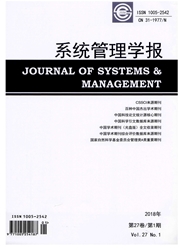

 中文摘要:
中文摘要:
企业绩效管理是现代企业管理中一项很重要的环节,通过绩效考核可以实现对企业内部各个部门的管理,而绩效考核指标的合理选取成为委托人设计代理契约的基础和依据。为此,将绩效考核关联度、交互性任务纳入到最优激励契约设计中,并运用比较静态分析方法研究两者是如何影响最优激励选择的。研究结果发现,绩效指标和管理任务之间相互关联,管理人员的任务如是互补或替代时,任务之间的相互作用会影响各项绩效指标所带来的增量信息。在一定条件下,绩效指标之间相互关联度的提高会促进利润的增加。但若任务之间是相互替代的,则绩效指标关联度的提高可能会导致利润的增加也可能使利润减少,这取决于指标间的相对方差水平。在此基础上,提出了委托人设计激励契约时要注重非财务指标的应用,既要分析各个绩效指标之间的关联度,也要注重分析多任务之间的关联性;同时,要注重综合绩效指标和分散绩效指标的运用等政策建议。
 英文摘要:
英文摘要:
Performance management is a very important in enterprise management. Performanee appraisal can he achieved by various departments within the enterprise management, and the reasonable selection of performance indicators is the foundation and basis in designing agency contract. We include interrelated performanee measures and interactive effort into the project of the optimal incentive contract, employing the comparative static analysis method to study how interrelated performance measures and interactive effort affect the choice of optimal incentives. The study indicates that both performance measures and managerial tasks interact with each other. The incremental information that the various performance measures has brought about depends on the agent's tasks (i, e. , substitute or complementary). Moreover, we find that under certain conditions increases in performance measure interrelations translates into increased profits, if the task is mutual substitutable, the impact on the level of profits depends on the relative variance between indicators. Based on this, we put forward some policy suggestions. For example,when the principal designs the incentive contract, he or she should include non-financial indicators, and analyze both various interrelated performance measures and interactive effort. Meanwhile, attention should be paid to how to use the comprehensive performance measures and disaggregate performance measures.
 同期刊论文项目
同期刊论文项目
 同项目期刊论文
同项目期刊论文
 期刊信息
期刊信息
